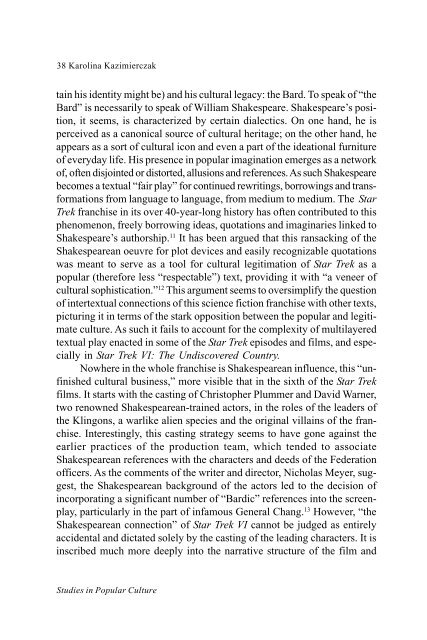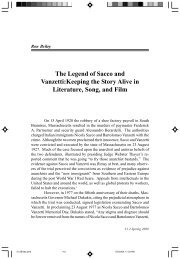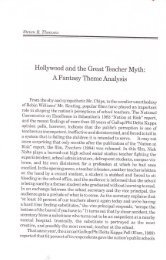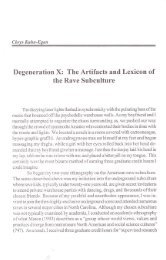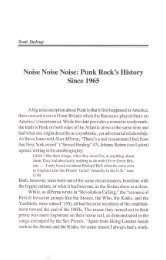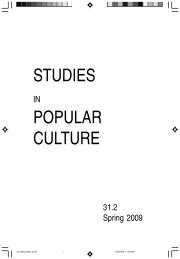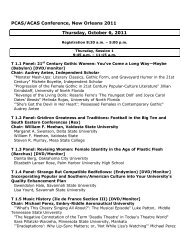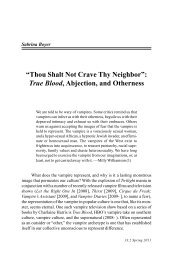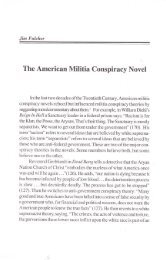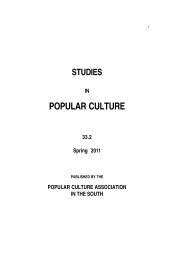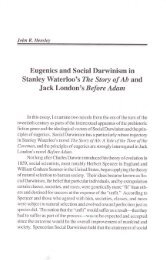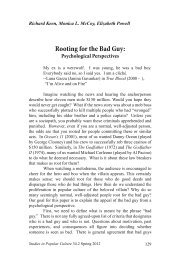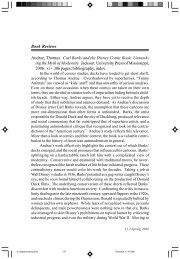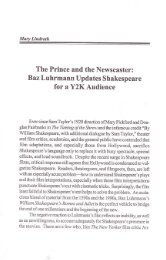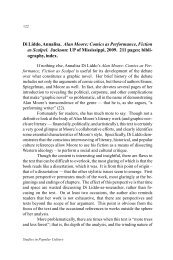Adapting Shakespeare for Star Trek and Star Trek for Shakespeare ...
Adapting Shakespeare for Star Trek and Star Trek for Shakespeare ...
Adapting Shakespeare for Star Trek and Star Trek for Shakespeare ...
Create successful ePaper yourself
Turn your PDF publications into a flip-book with our unique Google optimized e-Paper software.
38 Karolina Kazimierczak<br />
tain his identity might be) <strong>and</strong> his cultural legacy: the Bard. To speak of “the<br />
Bard” is necessarily to speak of William <strong>Shakespeare</strong>. <strong>Shakespeare</strong>’s position,<br />
it seems, is characterized by certain dialectics. On one h<strong>and</strong>, he is<br />
perceived as a canonical source of cultural heritage; on the other h<strong>and</strong>, he<br />
appears as a sort of cultural icon <strong>and</strong> even a part of the ideational furniture<br />
of everyday life. His presence in popular imagination emerges as a network<br />
of, often disjointed or distorted, allusions <strong>and</strong> references. As such <strong>Shakespeare</strong><br />
becomes a textual “fair play” <strong>for</strong> continued rewritings, borrowings <strong>and</strong> trans<strong>for</strong>mations<br />
from language to language, from medium to medium. The <strong>Star</strong><br />
<strong>Trek</strong> franchise in its over 40-year-long history has often contributed to this<br />
phenomenon, freely borrowing ideas, quotations <strong>and</strong> imaginaries linked to<br />
<strong>Shakespeare</strong>’s authorship. 11 It has been argued that this ransacking of the<br />
<strong>Shakespeare</strong>an oeuvre <strong>for</strong> plot devices <strong>and</strong> easily recognizable quotations<br />
was meant to serve as a tool <strong>for</strong> cultural legitimation of <strong>Star</strong> <strong>Trek</strong> as a<br />
popular (there<strong>for</strong>e less “respectable”) text, providing it with “a veneer of<br />
cultural sophistication.” 12 This argument seems to oversimplify the question<br />
of intertextual connections of this science fiction franchise with other texts,<br />
picturing it in terms of the stark opposition between the popular <strong>and</strong> legitimate<br />
culture. As such it fails to account <strong>for</strong> the complexity of multilayered<br />
textual play enacted in some of the <strong>Star</strong> <strong>Trek</strong> episodes <strong>and</strong> films, <strong>and</strong> especially<br />
in <strong>Star</strong> <strong>Trek</strong> VI: The Undiscovered Country.<br />
Nowhere in the whole franchise is <strong>Shakespeare</strong>an influence, this “unfinished<br />
cultural business,” more visible that in the sixth of the <strong>Star</strong> <strong>Trek</strong><br />
films. It starts with the casting of Christopher Plummer <strong>and</strong> David Warner,<br />
two renowned <strong>Shakespeare</strong>an-trained actors, in the roles of the leaders of<br />
the Klingons, a warlike alien species <strong>and</strong> the original villains of the franchise.<br />
Interestingly, this casting strategy seems to have gone against the<br />
earlier practices of the production team, which tended to associate<br />
<strong>Shakespeare</strong>an references with the characters <strong>and</strong> deeds of the Federation<br />
officers. As the comments of the writer <strong>and</strong> director, Nicholas Meyer, suggest,<br />
the <strong>Shakespeare</strong>an background of the actors led to the decision of<br />
incorporating a significant number of “Bardic” references into the screenplay,<br />
particularly in the part of infamous General Chang. 13 However, “the<br />
<strong>Shakespeare</strong>an connection” of <strong>Star</strong> <strong>Trek</strong> VI cannot be judged as entirely<br />
accidental <strong>and</strong> dictated solely by the casting of the leading characters. It is<br />
inscribed much more deeply into the narrative structure of the film <strong>and</strong><br />
Studies in Popular Culture


